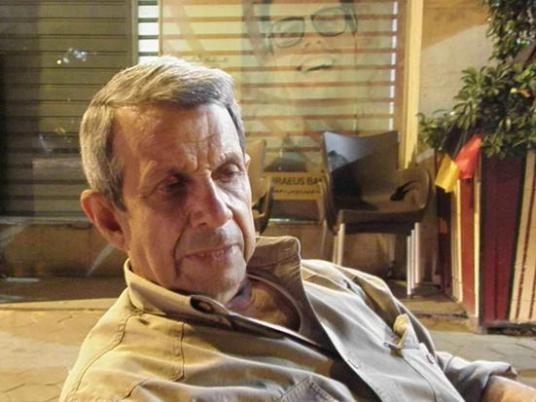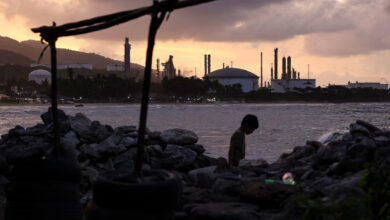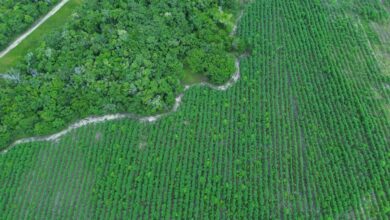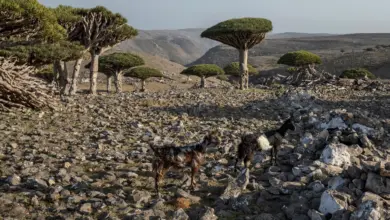
Ali Hamdy was director of the environmental department at the Ministry of Tourism — a position he created — from 1987 until his retirement in 2003. Among environmentalists he is now considered an important figure, the first to bring many of Egypt’s crucial environmental issues like pollution and the destruction of wildlife to the attention of both the public and the government.
Although the 68 year old comes across as a charming and easy-going lifelong environmentalist, his concern for environmental issues stems from an early life as an avid hunter.
Egypt Independent decided to sit down and talk with Hamdy about his early experiences as a hunter and later attempts to deal with the environmental issues that arose, and to find out what he thinks of Egypt’s current environmental battle.
“When I was very young, my father was very much into horticulture and gardening and being outdoors, which gave me an appreciation and love for nature at an early age,” he says. “But later, I also developed a strong passion for hunting.”
He acknowledges the apparent contradiction.
He became such a great hunter that when he was enlisted in the army in 1969, he was positioned as a sniper who fought in the 1973 Arab-Israeli War, though he is quick to mention that he never actually shot anybody.
Seeking to get out of the army after the war, Hamdy pursued several governmental jobs working as an executive officer. While continuing to hunt, he began to notice certain discrepancies.
“While I would love to go hunting, I also loved to read environmental books about nature and wildlife,” says Hamdy. “During this time in the late seventies, I started to notice a contradiction in not only my hunting practices, but particularly those of others, who seemed to be disregarding many of the conservationist issues that were prevalent in these books.”
Hamdy stresses that his love for hunting lay mainly in the sportsmanship of it, rather than in the killing of animals, which he claims he always kept to a minimum.
“Other hunters would be killing dozens of birds and animals in a single shooting, using not just rifles but machine guns and nets,” he says. He also noticed hundreds of illegal hunters from abroad taking animals to sell elsewhere. “I began to wonder if these animals might become extinct, and how it was affecting the environment.”
The books Hamdy was reading often referred to endangered animals charts and institutions that he says didn’t exist in Egypt at the time.
Upon learning about the subject, with the help of other environment-concerned Egyptians, Hamdy began researching, funding and making his own charts, which he presented to government officials.
Hamdy says he soon realized that many species — crocodiles and exotic birds — were extremely difficult to find and were fading away at the hands of hunters and a deteriorating environment.
Using contacts made in his executive government position, Hamdy eventually found himself establishing the environment department in the Ministry of Tourism.
“There weren’t really any institutions or informed personnel looking into these issues at the time,” he says. “Those who did, did so out of their own initiative,” creating the first serious instances of environmental awareness in Egypt.
Though the Ministry of Environment had been recently formed, Hamdy says their resources were incredibly low, and that he believed approaching the issues through tourism would be far more effective — a belief he holds firmly to this day.
“With a country as poor as Egypt, you can’t expect the government to want to pour money into environmental issues while people are starving and homeless,” says Hamdy. “For me, the best way to approach these issues is to make them a financial concern through ecotourism, where you can show that a deteriorating environment means a deterioration of Egypt’s national income.”
In the late 1980s Hamdy made it illegal for hunters to kill certain animals, getting harsh responses from hunters whose livelihoods and carefree hunting was hampered. Hamdy himself began hunting less and less as his concern for Egypt’s natural heritage grew.
“After the hunting charts were made, I began wondering what other critical environmental issues Egypt might be facing,” says Hamdy. “As you can imagine, the list was endless.”
Hamdy counts pollution, destruction of corals and trees, environmentally destructive construction practices and unsupervised tourism among many of the pressing issues that came to light. He soon hired a team of environmental scientists to join him at the ministry.
Another major issue he began to tackle was the deterioration of coral reefs in the Red Sea.
He says that up until the early 1990s it was still legal for tourists to take coral or fish out of the sea. Additionally, the reefs had been so uncared for that "crown-of-thorn" starfish — known for destroying many square meters of coral each per year — were abundant as pollution had created a decline in predator populations.
“With the team, we sought to carefully remove many of the destructive starfish, but also to create awareness about pollution to bring the corals and the sea back to a state of equilibrium,” he adds.
Despite this initiative, Hamdy admits considering the issues facing Egypt insurmountable, that without extensive awareness with more active parties, it would be pretty much impossible to address all concerns.
“Just because environmentalists and handfuls of others become aware of these issues in their personal lives, doesn’t mean that the whole country is going to care, even with awareness,” he says. “It’s difficult to maintain activity without incentives for all those involved across the board: government officials, investors, police officers, tour guides, etc.”
Hamdy says that he enticed the ministry to begin paying Bedouins to watch out for pollution and overfishing, a deal he claims was very effective until the funding was pulled by the new minister in 2000. “Decisions like that, without new strategies, made me feel quite hopeless in my last years,” he says.
He has resorted to teaching and training tour guides about environmental issues in his post-ministry years, and he still believes that certain tactics offer hope.
“Approaching the issues from the perspective of ecotourism will always be a perfect strategy, because Egypt needs money from tourism, so it will always be a way to equate environmental issues with financial gains, for both the government and investors,” he says.
Hamdy believes that, as proved by his own history, education is crucial. “When you educate somebody, the idea develops within the person on its own at their own pace,” he says.
But Hamdy the realistic believes that Egypt’s biggest hope lies with its protectorates: their preservation and the development of new ones.
“Tackling the whole country’s environmental issues is almost impossible, but with protectorates, you can easily allocate specific areas and personnel to monitor nature and protect wildlife in a controlled environment,” he says. “Combining this approach with a promotion of ecotourism, I believe that’s Egypt’s only hope at the moment.”
He adds that it’s important not to judge who will help fight for environmental causes, and who will not. “Sometimes the one you think might be the enemy might be the one eventually willing to help you the most,” he adds with a smile.




